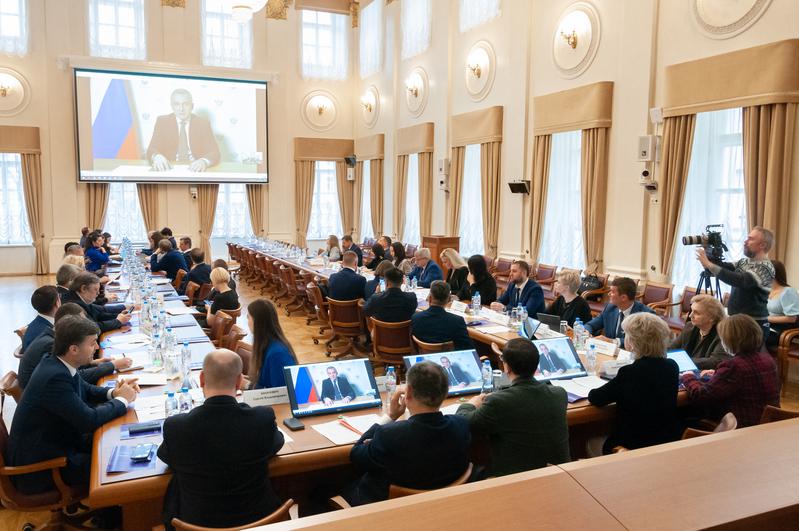
‘The Most Important Issue Today is to Successfully Navigate Stormy Waters’
Nandan Unnikrishnan, Distinguished Fellow and Supervisor of theEurasia Programme at the Observer Research Foundation (ORF), will talk at HSE University about the challenges and prospects of Russia-Indiarelations on December 8. The seminar will take place as part of the ‘India and Global Policy Challenges’ project.Olga Kharina, Research Fellow at the HSE Faculty of World Economy and International Affairs, and Nandan Unnikrishnan talked to the HSE News Service about the project.
.jpg)
‘AI Is a Tool, and Those Who Master It Will Have a Competitive Advantage’
HSE University is hosting the FIT-M 2022 International Scientific Forum. As part of this event, the HSE Cultural Centre held a series of lectures on November 29–30. On December 7–9, guests of the forum will have three days of practical work with scientists, IT industry leaders, businesspeople, and industry experts.

HSE Researchers Learn to Determine the Level of Happiness of Russians by Posts in Social Networks
Researchers at the HSE Graduate School of Business have created a model for calculating the indicator of subjective well-being, based on the analysis of 7.2 million posts on the Odnoklassniki social network. They found that the lowest level of observed subjective well-being can be registered in the morning, and the highest can be found in the late evening. The results of the study were published in the Mathematics journal.

HSE University to Launch New Carbon Test Site
A new HSE-operated carbon project—the Pokrovsky agricultural carbon test site—will soon be launched in the Moscow, Kaluga and Kirov regions. Its main purpose is to monitor greenhouse gas flows in the respective ecosystems to assess their carbon balance. The project is expected to produce the first Russian prototype of a comprehensive monitoring framework for ecosystems in agroforestry-based carbon farming.

HSE Researchers Contribute to Artificial Intelligence Journey Conference
The AI Journey international conference is a major platform for sharing cutting-edge innovations in artificial intelligence and machine learning. In late November 2022, AIJ was once again hosted by Sber. The conference was attended by HSE researchers from the Faculty of Computer Science and the Centre for Artificial Intelligence.

Meta-analysis Links Benevolent Sexism to Violence against Women
HSE researchers Elena Agadullina, Andrey Lovakov, Maryana Balezina and Olga Gulevich examined the potential links between different types of sexism – hostile and benevolent – and the likelihood of supporting or practicing violence against women. The authors conducted a meta-analysis of academic literature to find out how sexist attitudes can contribute to violence.

First Sino-Russian Economic Cooperation Workshop—Economic Performance from Regional Aspects
The HSE Faculty of Economic Sciences and the School of Economics at Shanghai University have co-organised the First Sino-Russian Workshop on ‘Economic Performance from Regional Aspects’. The researchers discussed how they detected and assessed the effects of different economic policies in Russia and China at a regional level.

‘Asian Studies is a New High Tech for Russia’
Russia's pivot to the East requires balanced actions, as well as knowledge of the languages, cultures, and traditions of Asian countries. Without this, Russian businesses will not be able to work there effectively. Experts and government representatives discussed the issue and the experience of Russia's regions working in Asia at ‘The Pivot to the East: The Regional Dimension’, the first interregional conference held by HSE University with the support of the Russian Ministry of Economic Development.

Only Left Hemisphere Involved in Action Naming
An international team including researchers from the HSE Centre for Language and Brain and the HSE Institute for Cognitive Neuroscience have demonstrated the critical role of the left, but not the right, inferior frontal gyrus in action naming. The study findings are published in Brain Structure and Function.

‘An STI-Accelerated and Informed Future is Possible’
The Twelfth International Academic Conference ‘Foresight and Science, Technology and Innovation Policy’ is kicking off at HSE University on November 22. Alexander Sokolov, chair of the organising committee, talked to the HSE News Service about the evolution of the foresight agenda. Two of the conference speakers, Ibon Zugasti from Spain and Mlungisi Cele from South Africa, shared some highlights of their research.


Submissions are open until October 13